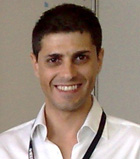Fajardo Portillo, Jose Oscar
Datos personales

Dirección: Alda. de Urquijo s/n. C.P.: 48013. Bilbao
Email: joseoscar.fajardo@ehu.es
Teléfono: +34 94 601 7361
Títulos académicos
Titulación universitaria
Título: Ingeniería de Telecomunicación
Intensificación: Telemática
Centro: Universidad del País Vasco
Fecha de obtención: 2003
Doctorado
Título del programa: Tecnologías de la información y comunicaciones en Redes Móviles
Fecha de obtención DEA: 2005
Título de la tesis: Adaptación de los mecanismos de provisión de calidad de servicio a las preferencias de los usuarios (Adaptation of QoS provisioning mechanisms to user requirements)
Fecha de obtención: (En proceso)
